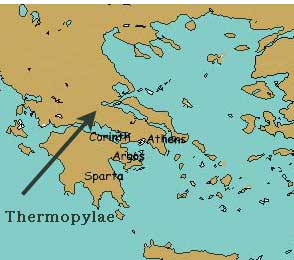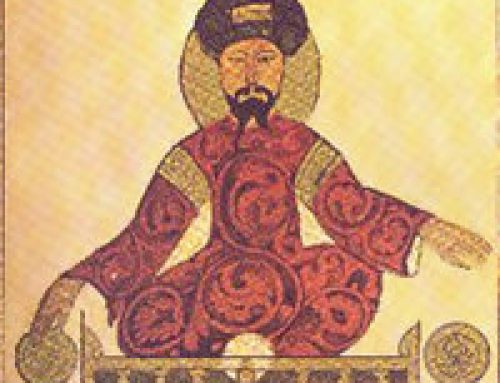
Map of Greece showing where Thermopylae is
The Persians are coming!
The Greeks heard that Xerxes and the Persians were coming. They disagreed about what to do. The Spartans and Corinthians wanted to abandon northern Greece and only defend southern Greece (where they were). But the Athenians insisted that they should try to defend northern Greece at the pass of Thermopylae. The Spartans and Corinthians didn’t want to seem cowardly. So they finally agreed to try it.
Who were the Spartans?
And the Athenians?
Who are the Persians?
The Second Persian War
Classical Greek history
All our ancient Greece articles
Can they stop the Persians?
So the Athenians, the Spartans, the Corinthians, the Thebans, and some other soldiers from smaller cities all marched north to Thermopylae to try to stop the Persians. They got there and set up stone barricades across the narrow gap between the cliffs. The Persians attacked, but for several days they could not get through the pass. The Greeks were happy that their plan was working.
Who were the Thebans?
Who were the Corinthians?
Greek hoplite soldiers

Thermopylae
But a traitor helps the Persians
But after a few days, a Greek traitor told the Persians about another, smaller mountain pass where a few Persian soldiers could get through. Part of the Persian army secretly came around this back way and surrounded the Greeks.
How can the Greeks escape?
Although the Thebans surrendered to the Persians, most of the Greek soldiers were able to get away to the south. But they needed time to march away, so that the Persians coming through the pass wouldn’t catch them. A group of three hundred Spartan soldiers, along with some others, agreed to stay at Thermopylae and fight the Persians even though they were surrounded. They would fight as long as they could, to give the others time to get away.
Learn by doing: build a model of Thermopylae
Defeat at Thermopylae
Bibliography and further reading about the Second Persian War:
Oxford First Ancient History, by Roy Burrell and Peter Connolly (1997). Lively interviews and pictures make the ancient Mediterranean come to life. For teens.
A Brief History of Ancient Greece: Politics, Society, and Culture, by Sarah Pomeroy and others (2004). For college students.
The Greco-Persian Wars, by Peter Green (1998). A popular history of the wars.
The Greek and Persian Wars 499-386 BC, by Philip De Souza (2003).
The Persian Wars, by Herodotus. Straight from the Greek historian himself!

What is Sparta
Sparta was a Greek city-state, like a small country, in the south of Greece. You can read more about it here: https://quatr.us/greeks/sparta-ancient-greece.htm